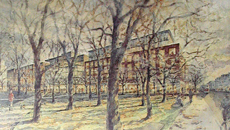Beyond the wall of mental health
by Isabelle Le Clair + Jean-Pierre Chupin, published 2008-09-01

In this new 2008-2009 academic year update, L.E.A.P. proposes the rediscovery of two complementary competitions organised by the Toronto based firm Urban Strategies. Two events that have not benefited of the attention they were entitled to expect concerning a problematic as delicate as mental health.
These two competitions were organised for the benefit of the Center For Addiction and Mental Health with the help of Urban Strategies in 2001 and 2003. Besides the brief's specificity, it is mostly the nature of a down town Toronto site that needs to be underlined as the major stake of these competitions. An ageing enclave on the verge of being stigmatised at any moment and a place where the undesired are cloistered and that our urban societies are not ready to welcome but rather lock up.
Venerable institution of the mid 19th century, evocatively and worrisomely named the Toronto Lunatic Asylum, is today associated with the University of Toronto's Health Center. The Center for Addiction and Mental Health wished to open itself to the city and the world in order for the new psychiatric methods to benefit from an updated environment. Urban Strategies chose a consultation formula allowing to call upon the public at large. The first competition aimed at a general plan to submit to the Ministry of Health and Long Term Care. The second competition, ‘The Wall', had for an objective to symbolically and artistically qualify the limits of the property. Classed as a historic monument by the Toronto authorities, this wall was to become a threshold and in some ways a public event.
Carried off in the early 21st century by the Community Care Consortium Community Care Consortium (Kuwabara Payne McKenna Blumberg Architects / Montgomery Sisam Architects Inc. / Kearns Mancini Architects Inc.), the Center For Addiction and Mental Health competition has headed a vast thinking process on the role of care facilities in an urban environment. In this era where Montreal painstakingly questions itself on the two mega-hospitals to be created in the next decades, certain decision-makers and commentators could eventually benefit from a prolonged stay… in Toronto! :))
PS : consulting agency of international calibre, Urban Strategies is one of these Toronto firms that strongly contributes to the moulding of big cities such as Toronto, Amsterdam or Buffalo. Through our collaborations, we have regularly noticed their concern in the diffusion of projects and thoughts mobilised in the occasion of competitions (it is thanks to them that we were able to also publish the Tip Top Tailor competition in the fall of 2006). Their engagement to public and private proxies has won them numerous prizes. We allow the L.E.A.P. researchers to join in on our congratulations.
These two competitions were organised for the benefit of the Center For Addiction and Mental Health with the help of Urban Strategies in 2001 and 2003. Besides the brief's specificity, it is mostly the nature of a down town Toronto site that needs to be underlined as the major stake of these competitions. An ageing enclave on the verge of being stigmatised at any moment and a place where the undesired are cloistered and that our urban societies are not ready to welcome but rather lock up.
Venerable institution of the mid 19th century, evocatively and worrisomely named the Toronto Lunatic Asylum, is today associated with the University of Toronto's Health Center. The Center for Addiction and Mental Health wished to open itself to the city and the world in order for the new psychiatric methods to benefit from an updated environment. Urban Strategies chose a consultation formula allowing to call upon the public at large. The first competition aimed at a general plan to submit to the Ministry of Health and Long Term Care. The second competition, ‘The Wall', had for an objective to symbolically and artistically qualify the limits of the property. Classed as a historic monument by the Toronto authorities, this wall was to become a threshold and in some ways a public event.
Carried off in the early 21st century by the Community Care Consortium Community Care Consortium (Kuwabara Payne McKenna Blumberg Architects / Montgomery Sisam Architects Inc. / Kearns Mancini Architects Inc.), the Center For Addiction and Mental Health competition has headed a vast thinking process on the role of care facilities in an urban environment. In this era where Montreal painstakingly questions itself on the two mega-hospitals to be created in the next decades, certain decision-makers and commentators could eventually benefit from a prolonged stay… in Toronto! :))
PS : consulting agency of international calibre, Urban Strategies is one of these Toronto firms that strongly contributes to the moulding of big cities such as Toronto, Amsterdam or Buffalo. Through our collaborations, we have regularly noticed their concern in the diffusion of projects and thoughts mobilised in the occasion of competitions (it is thanks to them that we were able to also publish the Tip Top Tailor competition in the fall of 2006). Their engagement to public and private proxies has won them numerous prizes. We allow the L.E.A.P. researchers to join in on our congratulations.














